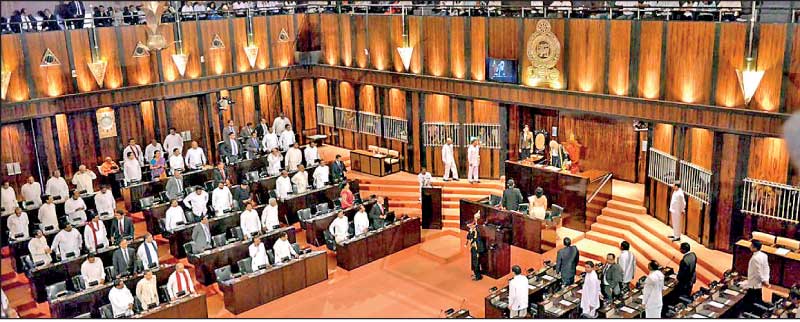Sunday Feb 22, 2026
Sunday Feb 22, 2026
Monday, 2 December 2024 00:31 - - {{hitsCtrl.values.hits}}

The NPP’s reliance on technocrats and professionals for key ministries underscores its commitment to expertise-driven governance
 The National People’s Power (NPP), following its landmark victory in the 2024 General election, has introduced a Cabinet that emphasises professionalism, inclusivity, and a break from traditional politics. While these appointments reflect the core tenets of the NPP manifesto, they also invite scrutiny regarding their feasibility and effectiveness in meeting the nation’s expectations.
The National People’s Power (NPP), following its landmark victory in the 2024 General election, has introduced a Cabinet that emphasises professionalism, inclusivity, and a break from traditional politics. While these appointments reflect the core tenets of the NPP manifesto, they also invite scrutiny regarding their feasibility and effectiveness in meeting the nation’s expectations.
1. Qualifications and relevance
Strengths:
The NPP’s reliance on technocrats and professionals for key ministries underscores its commitment to expertise-driven governance. Ministers with robust academic and professional credentials have been appointed to portfolios such as agriculture, health, and infrastructure, reflecting a clear focus on addressing systemic challenges through evidence-based approaches. Notably, the Ministry of Finance is directly led by the President, signalling the administration’s prioritisation of economic recovery. While not an economist, the President’s central role aims to streamline decision-making amid fiscal challenges, though it has drawn criticism for potentially sidelining specialised expertise.
Challenges:
While expertise is valuable, many appointees lack prior experience in governance or political negotiations. The absence of seasoned politicians in certain key positions may hinder the Government’s ability to navigate legislative hurdles or manage opposition effectively. Moreover, an overemphasis on academic credentials could alienate segments of the population who seek more practical, grassroots representation.
2. Inclusivity and representation
Strengths:
The NPP Cabinet marks a significant step forward in addressing diversity. A record number of women, as well as some representation from some minority parties have been included, showcasing the coalition’s commitment to gender equity and ethnic inclusion. Additionally, younger members in leadership roles signal the NPP’s intent to cultivate a new generation of leaders.
Challenges:
i. Gaps in broader community representation:
While there are efforts to represent various communities, the absence of members from certain key minority groups, particularly those with significant cultural and political influence in Sri Lanka, raises concerns. This lack of representation could hinder the Cabinet’s ability to fully address the needs and perspectives of all citizens.
ii. Regional imbalance:
The Cabinet’s composition reflects uneven representation across Sri Lanka’s diverse geographic regions, with some rural and underserved areas remaining underrepresented. This could reinforce historical patterns of neglect and alienate certain constituencies that played a critical role in the NPP’s electoral success.
iii. Symbolic appointments:
While diverse representation is evident, there are questions about the depth of these appointments. Critics argue that some roles may lean more toward symbolic gestures rather than strategic placements, potentially limiting the effectiveness of governance.
iv. Moving forward:
To strengthen inclusivity, the NPP could take steps to incorporate a broader range of perspectives from all communities, ensuring that minority and regional voices are better integrated into governance. A balanced and representative cabinet will be critical in addressing the diverse needs of Sri Lanka’s population while fostering trust and unity in the Government’s broader reform agenda.
3. Political savvy and strategic implications
Strengths:
The NPP’s approach to governance demonstrates a strategic shift towards transparency and credibility. Appointing individuals with clean reputations and a commitment to public service has reinforced the party’s anti-corruption ethos, which was central to their electoral appeal. Additionally, efforts to include representatives from varied socio-economic backgrounds, including women and youth, signal a progressive vision aimed at fostering inclusivity.
This strategy is complemented by the appointment of key technocrats to pivotal ministries. Such choices are indicative of a long-term approach that prioritises evidence-based policymaking over political patronage, a marked departure from past Governments.
Challenges:
Governance requires political manoeuvring, and many appointees may lack the experience to handle Sri Lanka’s intricate political dynamics. This gap may weaken the Government’s ability to secure support for critical reforms and pose potential risks in navigating the complexities of coalition politics and opposition engagement. This could hinder the Government’s ability to effectively implement its ambitious reform agenda, especially in contentious areas like economic restructuring and institutional reform.
Additionally, the centralisation of power in certain ministries has drawn criticism, with some fearing it could lead to inefficiencies or bottlenecks.
4. Alignment with manifesto promises
Strengths:
The NPP’s focus on economic stabilisation and anti-corruption, education reform, and public healthcare is evident in its Cabinet structure. Appointments in these areas suggest a practical approach to fulfilling campaign promises, with efforts to streamline policy implementation through skilled bureaucrats and deputies.
Challenges:
The ambitious reform agenda, especially in areas like economic restructuring and anti-corruption, requires substantial resources and cross-ministerial coordination. The Government faces the challenge of meeting high public expectations while managing practical constraints, such as limited fiscal space and entrenched bureaucratic inertia.
In conclusion the NPP Cabinet signals a significant departure from traditional governance, prioritising merit, diversity, and integrity. However, its effectiveness hinges on the ability to balance technocratic expertise with political strategy. The inclusion of some underrepresented groups is commendable, but practical challenges, including regional imbalances and governance inexperience, must be addressed.
While the appointments align with the NPP’s manifesto, the road to fulfilling these promises is fraught with challenges. Success will depend on the administration’s ability to deliver tangible outcomes quickly, maintain public trust, and navigate the complexities of Sri Lanka’s political and economic landscape.
As the nation watches closely, the NPP Cabinet must prove that its bold approach can translate into meaningful and lasting change.